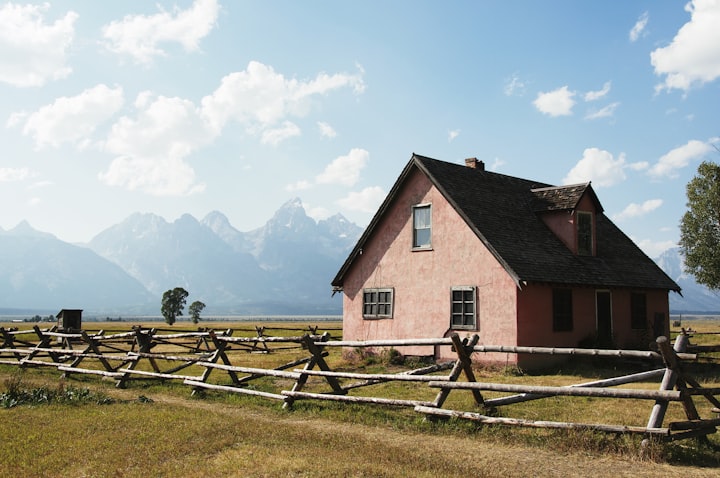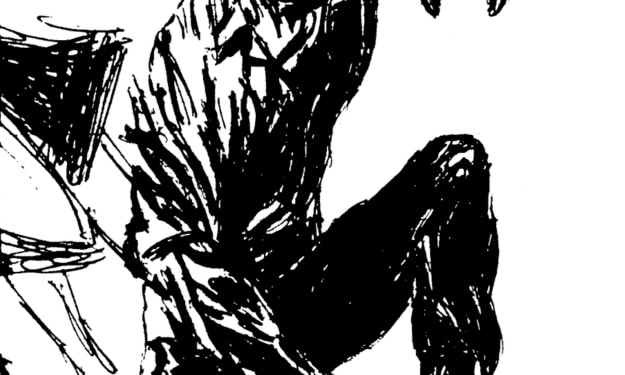Carry Me Home
A door unlocked is not always answered

Chloe hurried down the stairs when she heard the screen door whine open and then just as quickly slam shut. It was Sam she was hurrying to meet before he had the chance to see the faded jean jacket that belonged to no one he knew. “Simon’s home. He’s asleep. Let him be now. He came in late. He’s exhausted, says he feels sick but I don’t think so.”
Sam released the jacket from the back of the chair, studying it. It was worn and ruddy, much like his own and the dozens he wore through before, but it wasn’t from the soil beneath a farmer’s feet and hands. The sweat lying in its recesses was not native to honest work. He tossed it onto the extra chair in the corner they kept for visitors.
Cloe poured the coffee, extra strong, the way he preferred. She settled hers with a healthy stream of milk. “Sam, be extra kind.”
He picked up the Gazette. “I won’t say a thing.”
“That’s not being kind. That’s being abrupt.”
The Gazette was folded back and over, a photo of the latest stretch of pipeline running through an barren field staring back at Chloe. Sam expounded, “Don’t know what to say to the boy so I won’t say nuthin’.”
“Let’s start there; he’s not a boy.”
“Acts like a boy.”
“A boy doesn’t go out on his own for two years.”
“Boys run away all the time.”
“Drop the paper and let us talk.”
It went down slowly, like the curtain on the final act of a tragedy. “He’ll be down soon, Sam. You mustn’t shame him. He says he’s sick but I think it’s more. He feels humiliated, a failure.”
“It’s a good thing for a boy, a man, to be humbled by his own prides. I’ll not shame him further.”
“Sam?”
“Yes?”
“Do you remember why he left?”
“Of course I do. To be free of us and this place.”
“Us? Not us. To find himself.”
“Touchy-feely nonsense.”
“It’s not, Sam. He had a purpose.”
“He had an attitude.”
“An itch.”
“A resentment.”
“A dream. A dream to be an actor.”
Sam shook his head then shrouded it behind the Gazette.
“You had dreams.”
“What I had were obligations.”
She slapped the back of the Gazette playfully with her cup, the photo advertising a sixty-inch Titan Soil Pulverizer for sale. “Don’t be shy about your boyhood. There were dreams before the obligations.”
“Ah-huh.”
“Wasn’t I one of those dreams?”
“More like one of the obligations.”
“I know one.”
“Stop it.”
“You were going to be on the pro bowlers’ tour.”
“It was just a joke from years and years ago.”
“Nothing said when you’re that young comes and goes as a joke. You wanted to be a bowler.”
“Until obligations got in the way.”
“So be it. But be nice with him. Remember and be nice. He needs to know.”
“Know what?”
“That you had dreams once.”
Sam lay the Gazette on the table, after ingesting only the first three paragraphs, a story on the recent closing of Gabe’s Diner. Gabe was dead, and now so was Olivia, his wife. His two daughters were coming back from out east somewhere to auction off the contents. “Since when hadn’t I been anything but nice to the boy, and yes, still a boy. I told him when he wanted to go to go. I told him the door was always open to him here, if that door was still ours, that is. He never even wrote us.”
“Folks today don’t write.”
“And ain’t that the truth. Hardly ever called.”
“He called; you wouldn’t talk. “Busy, tell him,’ is what you wanted me say, like life on the farm was too busy for a conversation with your son. I didn’t though. He’d know it was just you telling him he was wasting his time, loafing. Who has time to talk if he wasn’t loafing? Be nice is what I’m telling you. You owe him that.”
Sam went to pour another cup of coffee. Chloe picked up the Gazette. “Says no rain all week.”
“Yeah, will be, though. Those buttheads are always wrong. Almanac calls for a wet month.”
“Really Sam, the Almanac?”
“No lie; it’ll rain.”
Chloe swatted a swinging cobweb with the Gazette. “Sam?”
“Yeah?” He was on his feet, looking out the back window at the wheat rows and the clouds that weren’t there.
“Are you angry the way it turned out? I mean, us, the farm, me?”
He didn’t answer as quickly as she would like. And when he did there was a wispy sigh to his voice. He was talking at least. Maybe it was Simon’s coming home. Maybe it was her mention of his dreams. She let it go. The moment was right for just one revelation at a time. “It’s all fine,” he said. He turned to her, bringing with him his compelled smile, the one he used with relatives on holidays, and the drive-by shoppers at the farmers’ markets.
“I don’t think I ever told you so but I think you could have made the tour.”
“Damn straight. Ranked fifth in the state. My last year, I had a two-o-four average. That was a twelve pin swing from the year before. Know how hard it is to break two-hundred for a season average? Could have gotten up to two-ten, higher. Course have to be higher to compete with the big boys; Monacelli, Williams, Weber, Duke, those guys.”
He was animated. It had her smiling. His days were drudgery. His nights were recovery. He toiled to feed the world to feed his family. He cursed the weather and the soil. He battled tax assessors. He raged against lower floor prices and rising insurance premiums. It did his mind better to scowl rather than smile, in spite of how it upset his stomach and tortured his soul.
“You’re smiling. This about Simon? These questions? That where this is coming from?”
“No, just that it’s important to say things.”
Simon was their youngest by six years. When the talk came to Simon, which it rarely did, when he was gone, when he was in New York, Sam would insert somewhere, “Maybe it would have been best not to have had a third one. Maybe we got too old to raise another. The others, them you could talk to; they would listen. They left the farm with a plan, not a dream.”
“Think they’re happy?”
“Happy? Course. Look what we slaved to give them. A doctor and a lawyer, that’s success; that’s happiness.”
“You had that ambition once.”
“What’s that supposed to mean?”
“Just that. You didn’t want to settle. You needed something that pushed you. Personal challenges. Always a higher score. Always better than average. What you got was the farm from your dad and his dad.”
“Where’s that boy?”
Chloe was already heading up the stairs. She was back in short order.
Sam was muttering at the window. There was trouble on his reflected face that he stared at with deep set dark eyes and chewed through with wire-taut jaws. “Tried teaching him a clove hitch. Couldn’t get it; kept making two square knots. Or one square knot and one half hitch.”
“What for?” Choe said.
“What for? Most important knot there is, that’s what for. Can’t make a buntline without a clove hitch; can’t make a binding knot to tie bunches of ropes and ends together. Every boy needs to know how to make a clove hitch. Like shooting a gun, riding a bike.”
“No, that’s what he said, ‘what for?’ Remember what you told him?”
“Don’t remember none of that. Where’s he at?”
“He’s resting. You should see him, so quiet, so at peace. Like when he small and would curl up with Jody on her dog cushion. I think he came home for that, to make a peace with himself and with you. So, Sam, be kind.”
“So what was it I said?”
“Said? Oh, that. You told him he had to learn because you said to.”
“I didn’t tell him that.”
“You don’t remember what you said.”
“But it wasn’t that.”
The pot was empty. He’d been up since five, ninety minutes before the sun. He was jealous of the sluggish sun whose rising and setting went unchallenged yet all life revolved around it. All fortunes, all privations. It had no master. Its dictates were final, and failure to acquiesce sealed destinies.
“They don’t write or call,” Chloe said.
“Who?”
“The others.”
“Damn, Chloe, stay in the same paragraph. I get dizzy following your thoughts around. They’re busy. Doctors and lawyers are too busy to make calls.”
“You’re not so agreeable when ours don’t return calls. Anyway, you visited them in Seattle and San Francisco.”
“Point?”
“But not the one in New York.”
“Who wants to go to New York? Other than him.”
“Simon.”
“Simon, yes. We had grandchildren out there. How else we supposed to see them.”
He should be awake plenty, after the haying and milking and setting out the feed. Stall cleanout was next. Stump clearing after felling the three trees that crushed fifteen feet of stone wall. Yeah, restack the stones. Maybe tomorrow or next week. Had to get to town for the clutch assembly that Tony Chambers called about, came in two days ago from Tractor Parts Direct but he hadn’t made the time.
“Where is he anyway?”
“I told you, resting.”
“Resting,” Sam said with a huff. “Well, he lived his dream. Hope he’s through with it.”
“And if he is then what? What’s for him back here. That’s what he’ll want to know.”
“I don’t have the answer to that. I told him the door was open when he came back. It was and so here he is. Getting away should be plenty for him to know what he can’t do and now has to do.”
“Can’t do? That’s awfully harsh, Sam. Stop being so angry with him because his dream wasn’t yours, because you both tried and it didn’t work out. That makes you more alike than you want to admit. I’ve lived here all me life and I don’t think getting away is the same as living a dream. He’s come home to share that with you so be nice.”
“I’m not angry so stop with that again. I’m disappointed.”
“Someone in his state can’t see the difference.”
Still moments passed allowing thoughts to gather. Rain clouds over parched fields, or perhaps an optimistic sun. “I guess,” Sam said, haltingly, “listening to him would have been a good thing. I know farming. I know a little about law and medicine. Those things make sense to me. Like bowling made sense. It was just a game, I know, but doing it made sense. My father ... he said −”
“Sam?”
Sam looked at his wife, married thirty-six years, since he was twenty-one and she, twenty. They met in high school but barely spoke. They met again, where else, Puget’s Bowling Paradise. She was pregnant within the year. He quit bowling completely and worked his father’s farm, living in a long-abandoned laborer’s shack for seven years before moving to the big house when his mother died and his father gave up. “I didn’t quit for you, or the children.”
“Truly? I thought −“
“I know what you thought; I know what I led you to believe. But it was him, it was my father. Without his approval, I don’t know. I don’t know why it bothers me now but it does.”
“It bothers you now because it bothered you then. There are things that stay with us always, the good and the bad.”
“But I was good, wasn’t I?”
“Yes, you were.”
“I guess that should have been enough.”
“Sounds like something Simon may need to hear from you.”
“I’ll wait for him to come down.
“No, Sam, go to him.”
“He’s asleep.”
“He’s resting. Go to him.”
Sam went up. Chloe opened the Gazette, drawn to a story on page six, a stray dog and her litter rescued in a wooded area by a pond. She heard Sam coming down. One set of footsteps only, his, though slower than was usual. Leaden, uninspired, with no sense of urgency to continue the day or the conversation. He collapsed onto the chair, reaching his hand out to her. She took it with hesitation. “Dead,” he said.
About the Creator
John Ouellet
Retired Special Agent FBI. Resides in Michigan. Originally from Boston Mass area. Novels: The Captive Dove and Cats & Dogs. Website: jOuelleteMontayne.com






Comments
There are no comments for this story
Be the first to respond and start the conversation.